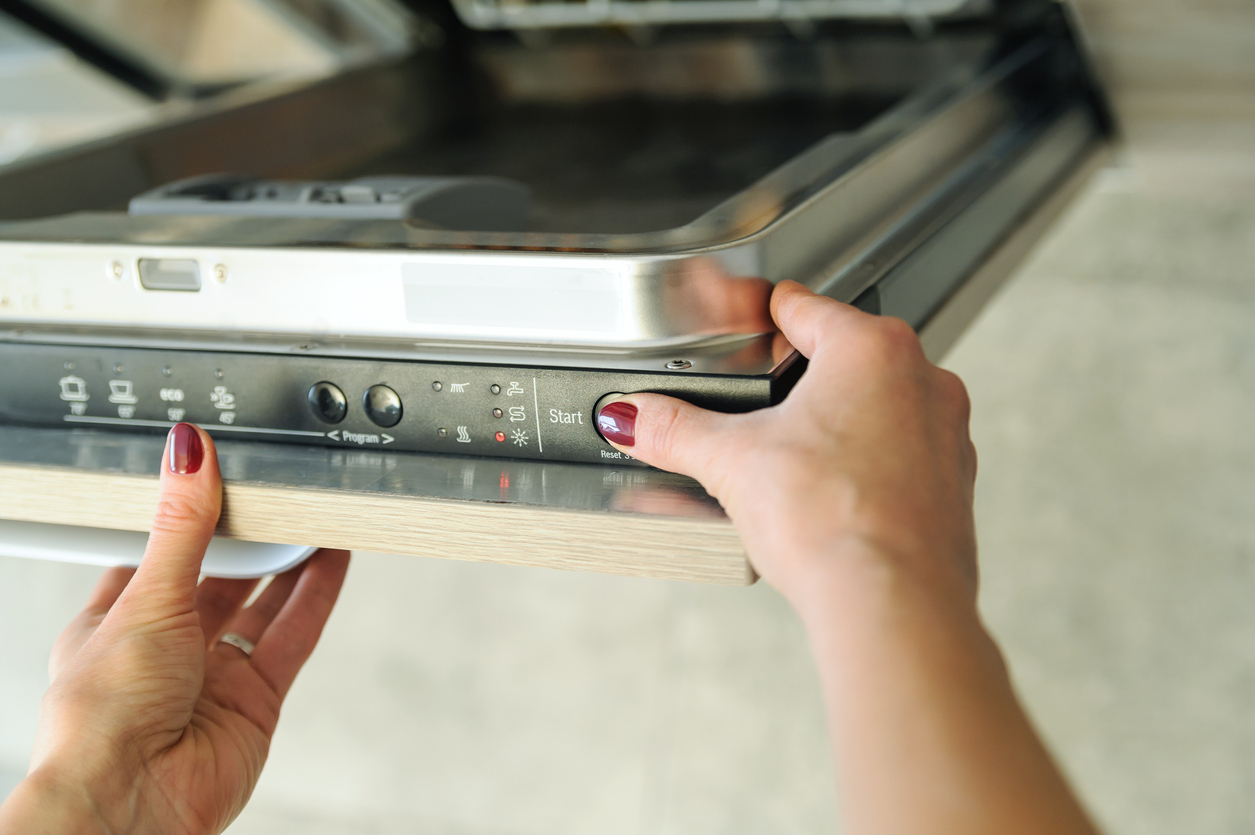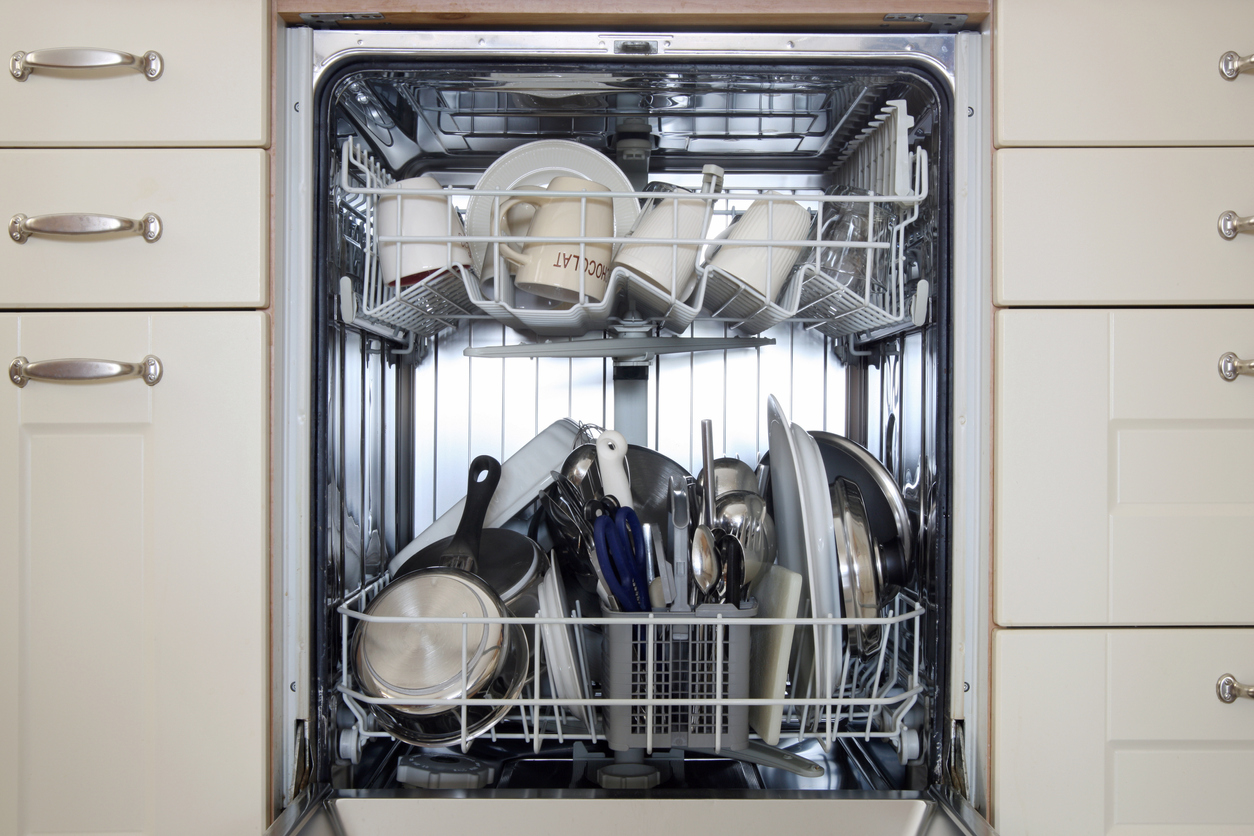We may earn revenue from the products available on this page and participate in affiliate programs. Learn More ›
We’ve all been there—dinner is over, and now comes the part of your evening you dread the most: tackling that mountain of dishes. For those lucky enough to have a dishwasher, the task is less daunting. But did you know that when you run your dishwasher can have a significant effect on your energy costs? By making some simple changes to your dishwashing routine, you can save money and energy, benefiting both your wallet and the environment. Here’s everything you need to know about the best time to run your dishwasher.
RELATED: 12 Smart Dish Washing Hacks No One Ever Taught You
Understanding Peak and Off-Peak Energy Times
Many utility companies offer the option of a time-of-use (TOU) pricing structure. In this system, utility providers charge consumers more during peak times, when the demand for electricity is high, and less during off-peak times, when the demand is lower. Exact peak times vary by energy provider and region, but they generally align with the periods when most people are home and using electricity. Peak times are typically early mornings before work and evenings.
Peak and off-peak times, as well as the costs associated with them, can change with the season or even the day of the week. For example, weekends often have lower rates, and prices may differ in the summer and winter due to increased heating or cooling needs in the area.
RELATED: How to Clean a Dishwasher
Maximizing Savings With Strategic Dishwashing
It would be easy to assume that the cost of running an appliance during peak vs. off-peak hours would be insignificant, but in reality timing can make a major difference. If you’re able to limit your energy use during peak hours, TOU pricing can help you dramatically lower your energy bills. For example, under one of these programs in New York City, the cost of energy during off-peak hours (midnight to 8 a.m. from June 1 through September 30) is a mere 7 percent of the peak rate. By understanding your energy provider’s peak and off-peak times, you can choose to run your dishwasher during off-peak periods when energy costs are lower. You won’t be sacrificing any of the conveniences of using a dishwasher—you’ll just have to schedule your cleaning cycles a little more strategically.
The Best Time to Run Your Dishwasher

Now that you understand the impact of running appliances during off-peak hours, let’s explore the best time to schedule your dishwasher to run. Off-peak hours almost always fall in the middle of the night when most households use less electricity. Fortunately, many modern dishwashers are equipped with a delayed-start feature that lets you set your dishwasher to start its cycle at a time of your choosing. This feature allows you to load and program the dishwasher at your convenience, but actually run the cycle when energy rates are at their lowest, saving you money in the process.
RELATED: How to Load a Dishwasher the Right Way
Energy-Efficient Dishwashing Practices

Beyond timing your wash cycles more strategically, there are other ways to use your dishwasher more efficiently and economically. First, always run full loads to minimize the amount of energy used per dish. If you live in a smaller household and worry about food drying onto plates before the load is full, many modern dishwashers offer a “rinse and hold” feature that rinses dishes without completing a full wash cycle.
Second, consider using the “eco” mode or energy-saving feature if your dishwasher has one. This setting usually washes dishes at a lower temperature and saves water, reducing both energy usage and costs.
Third, skip the heated dry cycle. It uses at least 15 percent more energy than the air-dry cycle. Instead, open the door slightly after the wash cycle has ended to let the dishes air-dry naturally, or use the “’air-dry” setting if your model has one.
RELATED: 16 Things You Should Never Put in the Dishwasher
The Benefits of a More Energy-Efficient Dishwashing Routine
The savings from making these changes to your dishwashing routine can add up over time, reducing your monthly energy bill. On top of the financial benefits, using your dishwasher during off-peak hours can help lower overall peak electricity demand, reducing the strain on the power grid and, in turn, lessening the need for energy production during these high-demand periods. If a substantial portion of a city, or even a neighborhood, were to adopt these practices, the reduced demand during peak hours could lead to substantial energy savings on a broader scale, contributing to lower carbon emissions.
Embrace these simple practices and enjoy the satisfaction of saving money and positively impacting our planet.


